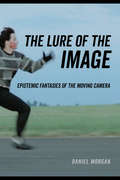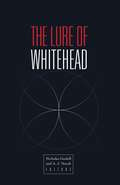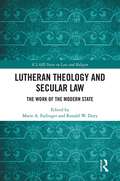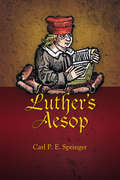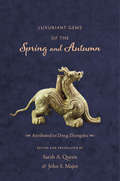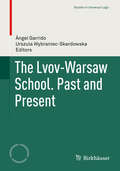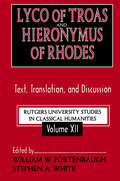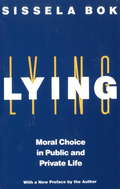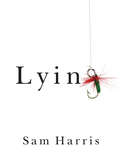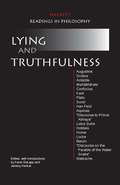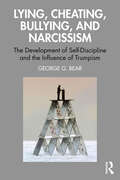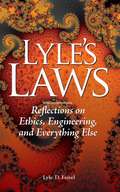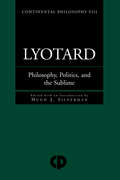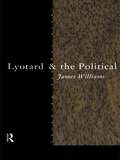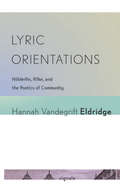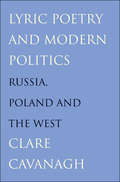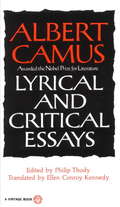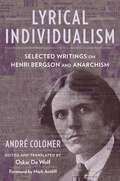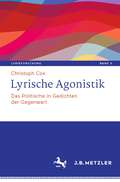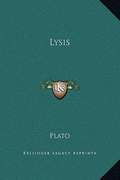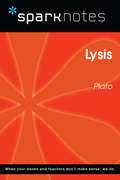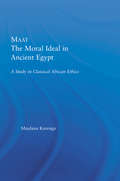- Table View
- List View
The Lure of the Image: Epistemic Fantasies of the Moving Camera
by Daniel MorganThe Lure of the Image shows how a close study of camera movement challenges key assumptions underlying a wide range of debates within cinema and media studies. Highlighting the shifting intersection of point of view and camera position, Daniel Morgan draws on a range of theoretical arguments and detailed analyses across cinemas to reimagine the relation between spectator and camera—and between camera and film world. With sustained accounts of how the camera moves in films by Fritz Lang, Guru Dutt, Max Ophuls, and Terrence Malick and in contemporary digital technologies, The Lure of the Image exposes the persistent fantasy that we move with the camera within the world of the film and examines the ways that filmmakers have exploited this fantasy. In so doing, Morgan provides a more flexible account of camera movement, one that enables a fuller understanding of the political and ethical stakes entailed by this key component of cinematic style.
The Lure of Whitehead
by Nicholas Gaskill A. J. NocekOnce largely ignored, the speculative philosophy of Alfred North Whitehead has assumed a new prominence in contemporary theory across the humanities and social sciences. Philosophers and artists, literary critics and social theorists, anthropologists and computer scientists have all embraced Whitehead&’s thought, extending it through inquiries into the nature of life, the problem of consciousness, and the ontology of objects, as well as into experiments in education and digital media.The Lure of Whitehead offers readers not only a comprehensive introduction to Whitehead&’s philosophy but also a demonstration of how his work advances our emerging understanding of life in the posthuman epoch. Contributors: Jeffrey A. Bell, Southeastern Louisiana U; Nathan Brown, U of California, Davis; Peter Canning; Didier Debaise, Free U of Brussels; Roland Faber, Claremont Lincoln U; Michael Halewood, U of Essex; Graham Harman, American U in Cairo; Bruno Latour, Sciences Po Paris; Erin Manning, Concordia U, Montreal; Steven Meyer, Washington U; Luciana Parisi, U of London; Keith Robinson, U of Arkansas at Little Rock; Isabelle Stengers, Free U of Brussels; James Williams, U of Dundee.
Lutheran Theology and Secular Law: The Work of the Modern State (ICLARS Series on Law and Religion)
by Marie A. Failinger Ronald W. DutyThis collection brings together lawyers and theologians in the U.S. and Europe to reflect on Lutheran understandings of the political use of the law by secular governments. The book furthers the intellectual conversation about how Lutheran insights can be used to develop jurisprudence and specific solutions to legal issues in which there is strong conflict. It presents the basic theological and interpretive assumptions of the Lutheran tradition as they may inform the creation of legislation and judicial interpretation at local, national and international levels. The authors explore Luther’s conception of the foundations of modern secular law and understanding of vocation. The work discusses the application of Lutheran theological principles to contemporary issues such as the war on terror, native land rights, property law, family law, church and state, medical experimentation, and the criminal law of rape, providing ethical insights for lawyers and lawmakers.
Luther’s Aesop (Early Modern Studies #8)
by Carl P. SpringerReformer of the church, biblical theologian, and German translator of the Bible Martin Luther had the highest respect for stories attributed to the ancient Greek author Aesop. He assigned them a status second only to the Bible and regarded them as wiser than "the harmful opinions of all the philosophers." Throughout his life, Luther told and retold Aesop’s fables and strongly supported their continued use in Lutheran schools. In this volume, Carl Springer builds on the textual foundation other scholars have laid and provides the first book in English to seriously consider Luther’s fascination with Aesop’s fables. He looks at which fables Luther knew, how he understood and used them, and why he valued them. Springer provides a variety of cultural contexts to help scholars and general readers gain a deeper understanding of Luther’s appreciation of Aesop.
Luther’s Aesop (Early Modern Studies)
by Carl P. SpringerReformer of the church, biblical theologian, and German translator of the Bible Martin Luther had the highest respect for stories attributed to the ancient Greek author Aesop. He assigned them a status second only to the Bible and regarded them as wiser than "the harmful opinions of all the philosophers." Throughout his life, Luther told and retold Aesop’s fables and strongly supported their continued use in Lutheran schools. In this volume, Carl Springer builds on the textual foundation other scholars have laid and provides the first book in English to seriously consider Luther’s fascination with Aesop’s fables. He looks at which fables Luther knew, how he understood and used them, and why he valued them. Springer provides a variety of cultural contexts to help scholars and general readers gain a deeper understanding of Luther’s appreciation of Aesop.
Luther’s Legacy: The Thirty Years War and the Modern Notion of ‘State’ in the Empire, 1530s to 1790s
by Robert Von FriedeburgIn this new account of the emergence of a distinctive territorial state in early modern Germany, Robert von Friedeburg examines how the modern notion of state does not rest on the experience of a bureaucratic state-apparatus. It emerged to stabilize monarchy from dynastic insecurity and constrain it to protect the rule of law, subjects, and their lives and property. Against this background, Lutheran and neo-Aristotelian notions on the spiritual and material welfare of subjects dominating German debate interacted with Western European arguments against 'despotism' to protect the lives and property of subjects. The combined result of this interaction under the impact of the Thirty Years War was Seckendorff's Der Deutsche Fürstenstaat (1656), constraining the evil machinations of princes and organizing the detailed administration of life in the tradition of German Policey, and which founded a specifically German notion of the modern state as comprehensive provision of services to its subjects.
Luxuriant Gems of the Spring and Autumn (Translations from the Asian Classics)
by Zhongshu DongThe Spring and Autumn (Chunqiu) is a chronicle kept by the dukes of the state of Lu from 722 to 481 B.C.E. Luxuriant Gems of the "Spring and Autumn" (Chunqiu fanlu) follows the interpretations of the Gongyang Commentary, whose transmitters sought to explicate the special language of the Spring and Autumn. The work is often ascribed to the Han scholar and court official Dong Zhongshu, but, as this study reveals, the text is in fact a compendium of writings by a variety of authors spanning several generations. It depicts a utopian vision of a flourishing humanity that they believed to be Confucius's legacy to the world.The Gongyang masters thought that Confucius had written the Spring and Autumn, employing subtle phrasing to indicate approval or disapproval of important events and personages. Luxuriant Gems therefore augments Confucian ethical and philosophical teachings with chapters on cosmology, statecraft, and other topics drawn from contemporary non-Confucian traditions. A major resource, this book features the first complete English-language translation of Luxuriant Gems, divided into eight thematic sections with introductions that address dating, authorship, authenticity, and the relationship between the Spring and Autumn and the Gongyang approach. Critically illuminating early Chinese philosophy, religion, literature, and politics, this book conveys the brilliance of intellectual life in the Han dynasty during the formative decades of the Chinese imperial state.
The Lvov-Warsaw School. Past and Present (Studies in Universal Logic)
by Ángel Garrido Urszula Wybraniec-SkardowskaThis is a collection of new investigations and discoveries on the history of a great tradition, the Lvov-Warsaw School of logic and mathematics, by the best specialists from all over the world. The papers range from historical considerations to new philosophical, logical and mathematical developments of this impressive School, including applications to Computer Science, Mathematics, Metalogic, Scientific and Analytic Philosophy, Theory of Models and Linguistics.
Lyco of Troas and Hieronymus of Rhodes: Text, Translation, and Discussion (Rutgers University Studies in Classical Humanities)
by Stephen WhiteVolume 12 in the RUSCH series continues work already begun on the School of Aristotle. It focuses on two Peripatetic philosophers who lived in the third century BCE, when Stoicism and Epicureanism flourished. Lyco of Troas was the third head of the Peripatos after Aristotle. Hieronymus of Rhodes was a member of the school and an antagonist of Lyco.Excellence in teaching was Lyco's distinguishing attribute, but he also attracted benefactors and had the reputation of being a bon vivant. Hieronymus is best known for his work on ethics, but he also wrote on literature, history, and rhetoric. Our understanding of the work being done in the Peripatos during the third century BCE will be greatly enhanced by Peter Stork's new edition of Lyco and Stephen White's edition of Hieronymus.The two editions in this volume are accompanied by full translations as well as notes on the Greek and Latin texts (an apparatus criticus) and substantive notes that accompany the translation. The editions will replace those of Fritz Wehrli, which were made over half a century ago and published without an accompanying translation. In addition to the two editions, this volume includes ten essays that address significant themes presented by the texts. Three of the essays deal with biographical material: "Diogenes Life of Lyco" (J orgen Mejer), "Hieronymus in Athens and Rhodes" (Elisabetta Matelli), and "Peripatetic Philosophers as Wandering Scholars" (Peter Scholz). Four develop philosophical topics: "Hieronymus of Rhodes on Vision" (Todd Ganson), "The Historical Setting of Hieronymus fr. 10 White" (Peter Lautner), "Peripatetic Reactions to Hellenistic Epistemology" (Hans Gottschalk), and "Lyco and Hieronymus on the Good Life" (Stephen White). Three concern rhetoric and literature: "Lyco Phrastikos" (William Fortenbaugh), "Hieronymus on Isocrates' Style" (David Mirhady), and "Hieronymus in Ancient Commentaries on Hesiod's Shield" (Andrea Martano).
Lying: Moral Choice in Public and Private Life
by Sissela BokA thoughtful addition to the growing debate over public and private morality. Looks at lying and deception in law, family, medicine, government.
Lying
by Sam HarrisAs it was in Anna Karenina, Madame Bovary, and Othello, so it is in life. Most forms of private vice and public evil are kindled and sustained by lies. Acts of adultery and other personal betrayals, financial fraud, government corruption-even murder and genocide-generally require an additional moral defect: a willingness to lie.In Lying, best-selling author and neuroscientist Sam Harris argues that we can radically simplify our lives and improve society by merely telling the truth in situations where others often lie. He focuses on "white" lies-those lies we tell for the purpose of sparing people discomfort-for these are the lies that most often tempt us. And they tend to be the only lies that good people tell while imagining that they are being good in the process.
Lying and Truthfulness
by Kevin Delapp Jeremy HenkelThis anthology provides a set of distinctive selections that explore both Western and Eastern views of lying and truthfulness, including selections from Augustine, Grotius, Aristotle, the Mahābhārata, Confucius, Kant, Plato, Sunzi, Han Feizi, Aquinas, the Lotus Sutra, Hobbes, Hume, Locke, Bacon, Nietzsche, and more. Hackett Readings in Philosophy is a versatile series of compact anthologies, each devoted to a topic of traditional interest in philosophy or political theory. Selections are chosen for their accessibility, significance, and ability to stimulate thought and discussion.
Lying, Cheating, Bullying and Narcissism: The Development of Self-Discipline and the Influence of Trumpism
by George G. BearThis vibrant book examines individual and societal factors contributing to the rise of lying, cheating, bullying, and narcissism, with emphasis on the influence of Trumpism and the valuing of “getting things done” over the importance of self-discipline and issues of morality. George Bear explores individual and environmental factors that influence the development of self-discipline. He examines reasons for the growing prevalence of lying, cheating, bullying, and narcissism and their underlying factors, and the role of parenting and peer relationships in their development. The volume highlights the critical roles that moral reasoning, moral emotions, and mechanisms of moral disengagement play in dishonest and harmful behavior. Lying, Cheating, Bullying, and Narcissism is for students and scholars of child development, parenting, psychopathology, and criminology; professionals in psychology, mental health, and education; as well as others interested in the prevalence and roots of lying, cheating, bullying, and narcissism in America.
Lyle's Laws: Reflections on Ethics, Engineering, and Everything Else
by Lyle D. FeiselThe author brings a very personal dimension to his commentary by sharing anecdotes about growing up on a farm, parenting three children, and traveling the world. Without preaching, he offers ideas on-and acknowledges the challenges of-conducting oneself appropriately, making good decisions, and navigating tough times. Educators and students will find Lyle's Laws to be a useful guide for courses on professional ethics and career preparation.
Lyotard: Philosophy, Politics and the Sublime (Continental Philosophy #Vol. 8)
by Hugh J. SilvermanFirst published in 2003. Routledge is an imprint of Taylor & Francis, an informa company.
Lyotard and the Political (Thinking the Political)
by James WilliamsLyotard and the Political is the first book to consider the full range of the political thought of the French philosopher François Lyotard and its broader implications for an understanding of the political. James Williams clearly and carefully traces the development of Lyotard's thought from his early Marxist essays on the Algerian struggle for independence to his break with the thought of Marx and Freud. This is compared with Lyotard's later, highly influental writings on the politics of desire and his attempts to base a postmodern political discourse on the sublime. An indispensable work for all who are interested in modern continental philosophy, Lyotard and the Political offers the first systematic analysis of the political dimension of the work of one of the most controversial and influential philosophers of the twentieth century. Also available in this series: Lacan and the Political Pb: 0-415-17187-3: £12.99 Heidegger and the Political Pb:0-415-13064-6: £12.99 Derrida and the Political Pb: 0-415-10967-1: £13.99 Nietzche and the Political Pb: 0-41510069-0: £12.99 Foucault and the Political Pb: 0-415-10066-6: £12.99
Lyric Orientations: Hölderlin, Rilke, and the Poetics of Community
by Hannah Vandegrifte EldridgeIn Lyric Orientations, Hannah Vandegrift Eldridge explores the power of lyric poetry to stir the social and emotional lives of human beings in the face of the ineffable nature of our mortality. She focuses on two German-speaking masters of lyric prose and poetry: Friedrich Hölderlin (1770-1843) and Rainer Maria Rilke (1875-1926). While Hölderlin and Rilke are stylistically very different, each believes in the power of poetic language to orient us as social beings in contexts that otherwise can be alienating. They likewise share the conviction that such alienation cannot be overcome once and for all in any universal event. Both argue that to deny the uncertainty created by the absence of any such event (or to deny the alienation itself) is likewise to deny the particularly human condition of uncertainty and mortality. By drawing on the work of Stanley Cavell, who explores how language in all its formal aspects actually enables us to engage meaningfully with the world, Eldridge challenges poststructuralist scholarship, which stresses the limitations--even the failure--of language in the face of reality. Eldridge provides detailed readings of Hölderlin and Rilke and positions them in a broader narrative of modernity that helps make sense of their difficult and occasionally contradictory self-characterizations. Her account of the orienting and engaging capabilities of language reconciles the extraordinarily ambitious claims that Hölderlin and Rilke make for poetry--that it can create political communities, that it can change how humans relate to death, and that it can unite the sensual and intellectual components of human subjectivity--and the often difficult, fragmented, or hermetic nature of their individual poems.
Lyric Poetry and Modern Politics
by Clare CavanaghLyric Poetry and Modern Politics explores the intersection of poetry, national life, and national identity in Poland and Russia, from 1917 to the present. As a corrective to recent trends in criticism, acclaimed translator and critic Clare Cavanagh demonstrates how the practice of the personal lyric in totalitarian states such as Russia and Poland did not represent an escapist tendency; rather it reverberated as a bold political statement and at times a dangerous act. Cavanagh also provides a comparative study of modern poetry from the perspective of the eastern and western sides of the Iron Curtain. Among the poets discussed are Blok, Mayakovsky, Akhmatova, Yeats, Whitman, Frost, Szymborska, Zagajewski, and Milosz; close readings of individual poems are included, some translated for the first time. Cavanagh examines these poets and their work as a challenge to Western postmodernist theories, thus offering new perspectives on twentieth-century lyric poetry.
Lyrical and Critical Essays
by Albert Camus'The literary output of Albert Camus was exceptionally concentrated and well organized, so that each part of it throws light on other parts. . . . Here now, for the first time in a complete English translation, we have Camus' three little volumes of essays, plus a selection of his critical comments on literature and on his own place in it. As might be expected, the main interest of these writings is that they illuminate new facets of his usual subject matter. '-John Weightman, The New York Times Book Review.
Lyrical Individualism: Selected Writings on Henri Bergson and Anarchism (Columbia Themes in Philosophy, Social Criticism, and the Arts)
by Andre ColomerIn the early twentieth century, André Colomer was perhaps the best-known figure in the anarchist movement. A poet, philosopher, activist, and public speaker, he was enmeshed in the Parisian political and artistic scene at a time of political and cultural revolution. Amid the avant-garde explosions of Cubism, futurism, and surrealism and the ferment of radical politics on left and right, Colomer became anarchism’s leading advocate. He galvanized the Parisian public through his agitational writing and organizing, as well as his involvement in a sensational murder case, while developing a distinctive philosophical account of anarchist individualism. Yet Colomer died in obscurity in Moscow, abandoned by his friends and comrades, and is scarcely known in the English-speaking world today.Lyrical Individualism presents a selection of Colomer’s crucial writings, with a focus on anarchist theory and the philosophy of Henri Bergson. It reveals the richness of Colomer’s philosophical work, particularly his creative engagement with Bergson, Max Stirner, and Friedrich Nietzsche to forge a novel anarchist ideology. Colomer’s writings not only offer valuable insights into interwar anarchism, they also present a distinctive philosophical vision that in many ways anticipates theories and debates animating radical political movements today. This book also showcases his acerbic and pugnacious political commentary on the turbulent events of the 1910s and 1920s. The first translation and publication of Colomer’s work since his untimely death in 1931, Lyrical Individualism allows a range of readers to discover this vital thinker.
Lyrische Agonistik: Das Politische in Gedichten der Gegenwart (Lyrikforschung. Neue Arbeiten zur Theorie und Geschichte der Lyrik #3)
by Christoph CoxAusgehend von der These, dass es sich bei der politischen Lyrik der Gegenwart vor allem um eine Lyrik des Politischen, eine lyrische Streitkultur handelt, wird in „Lyrische Agonistik. Das Politische in Gedichten der Gegenwart“ auf der Basis einer philosophischen ‚neue‘ Rhetorik und mit Rückbezug auf Ansätze der radikalen Demokratietheorie insbesondere von Chantal Mouffe und Ernesto Laclau eine neuartige rhetorische Methode zur Analyse des Politischen in der Lyrik der Gegenwart entwickelt. Grundlegend für diese Methode ist die von sophistischer Rhetoriktradition und radikaler Demokratietheorie geteilte Skepsis gegenüber allen epistemischen Letztbegründungsversuchen. Das Politische in der Lyrik der Gegenwart erweist sich im Kontext dieser beiden Bezugspunkte als die Zurückweisung fundamentaler Gründungversuche, die sich als diskursive Form der Verhandlung einer nur plausiblen, in ihrer Kontingenz stets angreifbaren Politik äußert. Ablesbar wird diese postfundamentalistische Wende in gegenwärtigen Gedichten anhand von rhetorischen Widersprüchen, die auf den unaufhebbaren konflikthaften Charakter des Politischen hindeuten, deren notwendige Gegenseite der ebenso rhetorisch ausgearbeitete Versuch ist, umstrittene Diskurse zugunsten einer nie letztbegründbaren Position zu hegemonisieren. Aufgezeigt wird das dem Politischen eigene Spiel aus Kontingenzerfahrung und Schließungsbemühungen anhand von drei disparaten Textbeispielen politischer Lyrik der letzten zehn Jahre: Tom Schulz’ „Die Maschinen sind volljährig“, Günter Grass’ „Was gesagt werden muss“ und Monika Rincks „was machen die frauen am sonntag?“.
Lysis
by PlatoNo answer is given in the Lysis to the question, ‘What is Friendship?’ any more than in the Charmides to the question, ‘What is Temperance?’ There are several resemblances in the two Dialogues: the same youthfulness and sense of beauty pervades both of them; they are alike rich in the description of Greek life. The question is again raised of the relation of knowledge to virtue and good, which also recurs in the Laches; and Socrates appears again as the elder friend of the two boys, Lysis and Menexenus. In the Charmides, as also in the Laches, he is described as middle-aged; in the Lysis he is advanced in years. The Dialogue consists of two scenes or conversations which seem to have no relation to each other. The first is a conversation between Socrates and Lysis, who, like Charmides, is an Athenian youth of noble descent and of great beauty, goodness, and intelligence: this is carried on in the absence of Menexenus, who is called away to take part in a sacrifice. Socrates asks Lysis whether his father and mother do not love him very much? ‘To be sure they do.’ ‘Then of course they allow him to do exactly as he likes.’ ‘Of course not: the very slaves have more liberty than he has.’ ‘But how is this?’ ‘The reason is that he is not old enough.’ ‘No; the real reason is that he is not wise enough: for are there not some things which he is allowed to do, although he is not allowed to do others?’ ‘Yes, because he knows them, and does not know the others.’ This leads to the conclusion that all men everywhere will trust him in what he knows, but not in what he does not know; for in such matters he will be unprofitable to them, and do them no good. And no one will love him, if he does them no good; and he can only do them good by knowledge; and as he is still without knowledge, he can have as yet no conceit of knowledge. In this manner Socrates reads a lesson to Hippothales, the foolish lover of Lysis, respecting the style of conversation which he should address to his beloved. After the return of Menexenus, Socrates, at the request of Lysis, asks him a new question: ‘What is friendship? You, Menexenus, who have a friend already, can tell me, who am always longing to find one, what is the secret of this great blessing.’
Lysis (SparkNotes Philosophy Guide)
by SparkNotesLysis (SparkNotes Philosophy Guide) Making the reading experience fun! SparkNotes Philosophy Guides are one-stop guides to the great works of philosophy–masterpieces that stand at the foundations of Western thought. Inside each Philosophy Guide you&’ll find insightful overviews of great philosophical works of the Western world.
Maat, The Moral Ideal in Ancient Egypt: A Study in Classical African Ethics (African Studies)
by Maulana KarengaFirst published in 2004. Routledge is an imprint of Taylor & Francis, an informa company.
